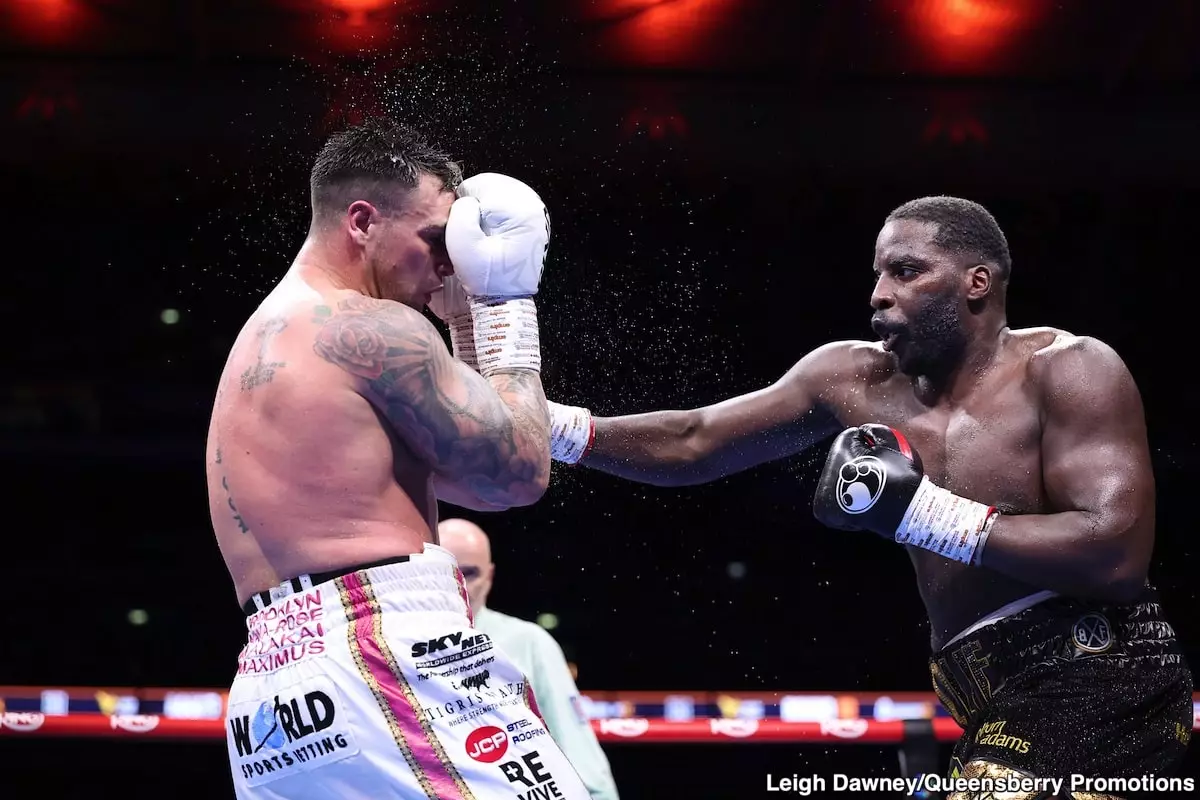In the realm of heavyweight boxing, the landscape is historically volatile, teeming with potential and unpredictability. Currently, the sport stands on the precipice of a significant transformation as reigning champions like Oleksandr Usyk contemplate relinquishing their titles. Such a move would inevitably lead to the fragmentation of the division’s belts, creating a frenzy of opportunities for aspirants eager to stake their claim. Among these contenders, Lawrence Okolie emerges not just as a participant but as a keen observer and potential kingmaker in this upheaval.
Okolie’s perspective underscores the inevitability of belt unification chaos. He anticipates that Usyk, who has symbolized technical finesse and perseverance, might relinquish his belts within the year, driven by his own strategic exit plans. This political and strategic shifting in the division affords a golden chance for fighters like Okolie, who, though relatively new to the heavyweight scene, are eager to capitalize on the chaos. Such conditions will test fighters’ resilience and adaptability—attributes Okolie claims he possesses in abundance.
A critical point, however, is the timing and tactical decisions that govern these transitions. The WBC interim champion, German boxer Kuban Kabayel, could ascend to full champion status with Usyk’s relinquishment, setting the stage for a high-stakes showdown. Okolie’s emphasis on maintaining his ranking and readiness reveals a fighter acutely conscious of opportunity and timing. His belief that he can beat top contenders like Kabayel and eventually emerge victorious aligns with his ascending trajectory and undeniable confidence. Yet, this confidence must be tempered by an honest assessment of the qualities and skills of his opponents—notably Kabayel’s rugged body work and explosive power, which will demand Okolie’s full tactical and physical commitment.
Strategic Ambitions and National Pride in the Heavyweight Arena
Far from being merely opportunistic, Okolie’s ambition reveals a fighter driven by a desire to cement his legacy. His interest in fellow British boxer Fabio Wardley exemplifies his strategic approach—choosing opponents who are both highly ranked and resonate culturally. Wardley’s recent edge-of-defeat comeback adds intrigue, demonstrating that Okolie views him as a formidable test. The British rivalry aspect adds a flavor of national pride that resonates deeply within the boxing community, fueling fans’ enthusiasm and elevating the stakes.
Interestingly, Okolie’s recent victory over Kevin Lerena highlights his sharpening skills and ability to adapt in the heavyweight division. His blend of power and technical growth signals a boxer evolving beyond his cruiserweight roots into a genuine heavyweight contender. This transition is critical—Okolie’s success will depend on how well he can combine his raw power with strategic boxing intelligence. Betting on himself, he openly claims that he believes he’s destined to seize the world titles, a statement that both inspires and invites criticism from skeptics who question whether he has truly reached the elite level yet.
His openness to engaging with fellow promising contenders, like Fabio Wardley and possibly Daniel Dubois, signals a strategic understanding of the division’s dynamics. Particularly, the potential showdown with Dubois, who is currently rebuilding after a tough loss, presents a fascinating narrative—one that could serve as a catalyst for Okolie’s ascent or a setback if he underestimates his rivals. The heavyweight division is notorious for its unpredictability, where even the smallest misjudgment can derail years of meticulous planning.
The Road Ahead: Who Will Seize the Opportunity?
What remains paramount for Okolie is the crucial moment when belts become vacant or fragmented. His preparedness to step into the breach hinges on maintaining his ranking and staying physically and mentally primed. The timeline—waiting for Usyk to relinquish titles—poses its own risks; holding a top spot in a divided landscape demands patience, resilience, and perhaps a dash of luck.
Okolie’s evolving skill set, combined with his strategic vision, hints that he might be the dark horse in the division’s chaos. If he can grasp the opportunity when it arises, he has the tools—raw power, rising experience, and keen ambition—to claim the sport’s most coveted titles. But he must also navigate a treacherous maze of promising fighters and political machinations, knowing full well that one misstep could confine him to the periphery instead of the pinnacle.
Furthermore, the division’s future hinges on how other top contenders like Usyk decide to play their hand. Will Usyk truly step away from the division? Will other champions hold onto their belts longer than expected? These questions linger, adding layers of complexity to an already complicated landscape.
In the end, Okolie’s journey is emblematic of the modern heavyweight’s challenge: transforming raw talent into legacy amid chaos and opportunity. If he seizes the moment and leverages the division’s inevitable fragmentation, he could step into the history books—not merely as a contender but as a visionary leader shaping the future of heavyweight boxing.

